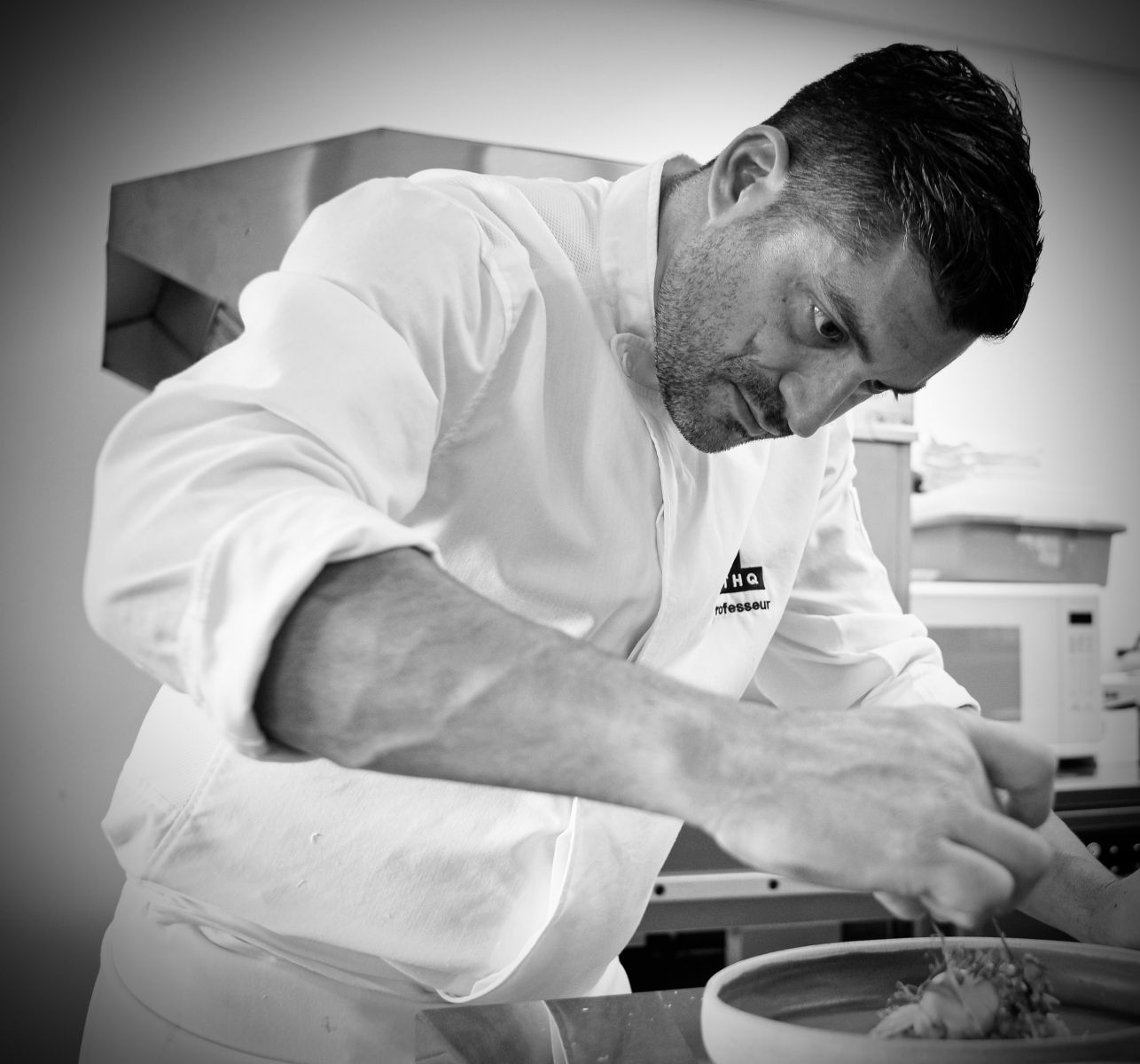Creating a Memorable Dining Experience Starts with Trust

Samuel Sirois is a chef and cookery instructor at the Institut de Tourisme et d’Hôtellerie du Québec in Montreal, Canada. With more than 20 years’ experience in the culinary industry, he is a highly-regarded chef who has represented Canada at culinary competitions such as the Bocuse d’or Canada 2019, Americas 2022, and the World in Lyon 2023, and he has also participated in some unique events around the world such as the Tram Experience 2023 in Brussels or the Columbia Food & Wine Festival 2024.
Although today his profession is more geared towards teaching future chefs, he is still involved in the industry, not only in the kitchen, but also in catering, services, hotels, events and banquets. Samuel works closely with Tourisme Montréal and was the protagonist of a conversation with HQ that crossed the catering and F&B sectors, with the social inclusion of food and the gastronomic diversity presented on the different palates of the delegates.
1) How can you cater for large numbers of guests without losing quality and attention to hospitality? How can we make it a less stressful, simpler and more fun experience?
Quality must be on top of everything. If I am not sure I can deliver quality to my guests, I refuse to do the event – that is the first part of my motto. Then, the difficulties I have faced on my journey as a chef have given me the opportunity to develop greater sensitivity and the chance to understand people better. My clients’ needs are crucial to me, so I need to understand them well and create a climate of mutual sharing. In other words, I need to know their special needs (socio-cultural habits, religious needs, rituals, etc.), allergies, and special diets (ovo-lacto, vegan, pescetarian), or simply their preferences. On the other hand, they have to understand my reality (the number of people working in the kitchen, the service of the event, the equipment, the atmosphere of the event, etc.), and the real capacity of the team to meet their needs and desires. Dining out is a huge responsibility for the host. The first responsibility as a chef/host is to demonstrate trust and clarity with guests/clients. When people feel safe and understood, they are somehow reassured about what comes next. In these cases, it is easier for both sides to participate with less stress.
2) Do you think event planners and organisers still treat food as an afterthought? Do you think more emphasis should be placed on catering at events?
 Unfortunately, I would say yes, but as in other areas, change is happening at a very fast pace. There are many different offers and the competition is fierce and sometimes brutal. So, as time goes by, people seem to be paying more attention to the food on offer in the events sector. However, for me, as a player in the food and catering industry, there definitely needs to be more emphasis on catering. Paying attention to food and service is like having insurance in case something goes wrong during the event; at least the guests will remember that the food was good and the service was kind. Let’s remember that smell and taste are very primitive senses. Therefore, it is easier to cater to the client’s other needs once these senses are satisfied. Catering should not be seen as a ‘cherry on top’ in the events sector, but as a fundamental aspect to be considered above everything else.
Unfortunately, I would say yes, but as in other areas, change is happening at a very fast pace. There are many different offers and the competition is fierce and sometimes brutal. So, as time goes by, people seem to be paying more attention to the food on offer in the events sector. However, for me, as a player in the food and catering industry, there definitely needs to be more emphasis on catering. Paying attention to food and service is like having insurance in case something goes wrong during the event; at least the guests will remember that the food was good and the service was kind. Let’s remember that smell and taste are very primitive senses. Therefore, it is easier to cater to the client’s other needs once these senses are satisfied. Catering should not be seen as a ‘cherry on top’ in the events sector, but as a fundamental aspect to be considered above everything else.
3) How do you manage to add an identity stamp to the cuisine of a destination without excluding any of your guests? How to include all those with dietary restrictions, allergies or food intolerances around a dish that is essential to your service?
It is simply impossible for me not to be inclusive, especially nowadays. As a Canadian, I am the result of all the cultures, traditions and shares of the people who have settled in my country, and this is reflected in my cuisine. As a chef, I consider myself an open-minded person today, so I can understand the importance of the identity of the cuisine, regardless of the circumstances. Including everyone is particularly good, but it is excessively demanding. Being a good chef means being able to adapt to all kinds of situations. Sometimes I have to face many challenges in the kitchen at the same time in order to respect all dietary restrictions, allergies, intolerances and/or cultural traditions. It is like being a tightrope walker and having to cross a thin wire. Whenever possible, I try to offer something to replace the problematic ingredient or dish if I know of a last-minute restriction. However, if I know that an ingredient or dish could be a problem for the customer, I usually simply choose to create another dish that meets the customer’s needs. Furthermore, these situations are opportunities to acquire solid knowledge of gastronomic creation: sometimes, I have substituted an ingredient and had the happy surprise of discovering new flavour associations. Gastronomy is plastic and malleable; you can always play with it if you are open to the diversity of cultures that inhabit this planet.
4) Therefore, do you have any suggestions on how to sufficiently and effectively communicate (before AND during the event), and how to organise and arrange the dish-delivery process smoothly, to improve the overall dining experience?
The more people you have on both sides – kitchen and service – the harder it is to communicate effectively and avoid mistakes. This is especially true when it comes to crucial information, such as a potentially lifethreatening allergy or dietary restrictions that need to be accommodated. Experience has taught me that in these situations it is best to have a single responsible person on each side, both in the kitchen and at the service level. You may say that this puts a strain on the human resources of a restaurant or event, but for me, it is crucial and unthinkable to do otherwise. We are talking about the difference between life and death, or at least between a healthy experience and a very unpleasant one.
In the kitchen, we always have an organised station to compensate for this type of situation, where everything is perfectly clean, safe and free of potential allergens. The person in charge prepares the food, the chef checks it and the head of the service brigade deals only with the target customer who needs this special attention. This organisational chain is the key to ensuring the smooth running and monitoring of the customer experience. This is an extremely expensive way for a restaurant or hotel to operate. For me, it leaves no chance of risking allergies or restrictions. The whole culinary experience depends on the host’s ability to build a relationship of trust with guests. As a chef, I find it very difficult to deal with the stress that the production of a dish can create when we talk about taking allergies into account. Simply because I feel responsible for providing not only the best possible culinary experience, but also an exceptional customer experience.
5) What kind of interactive gastronomic experiences have you carried out at events? In your experience, how can these activities raise the profile of a destination?
One of the activities that is not only interesting but also very captivating is the use of liquid nitrogen to create spontaneous ice cream. For example, during a promotional event, I made a special ice cream using camelina seed oil. Without the use of nitrogen, I would have had to use other processes, including food additives, which were not necessary in this case. It was wonderful because people discovered the taste of the oil, but they also got to see and experience another way of using the product. I also ran workshops on local vegetables and the fermentation process, which can highlight these vegetables. This becomes extremely interesting for people because they can taste products they know, but which have new flavours due to fermentation and preservation.
Planners need to make sure that the people attending the workshops are at least as interested as they are. For us, it is an opportunity to talk about our passion and introduce them to a particular world. Obviously, sharing knowledge, passion and techniques can enhance a destination, even encouraging clients to choose one place over another. People like the opportunity to take part in new experiences, and passion breeds passion. Sharing your art and knowledge with others is a moment that should remain in the memory of all participants. The impression of participating in the creation of a menu necessarily leads to free advertising or, at the very least, customer loyalty. Customers are human beings and they like to be considered, understood and respected in their choices. Therefore, if the interaction is well constructed, it will add value to the customer’s destination. The basis of the food industry is sharing, and we must never forget that.










